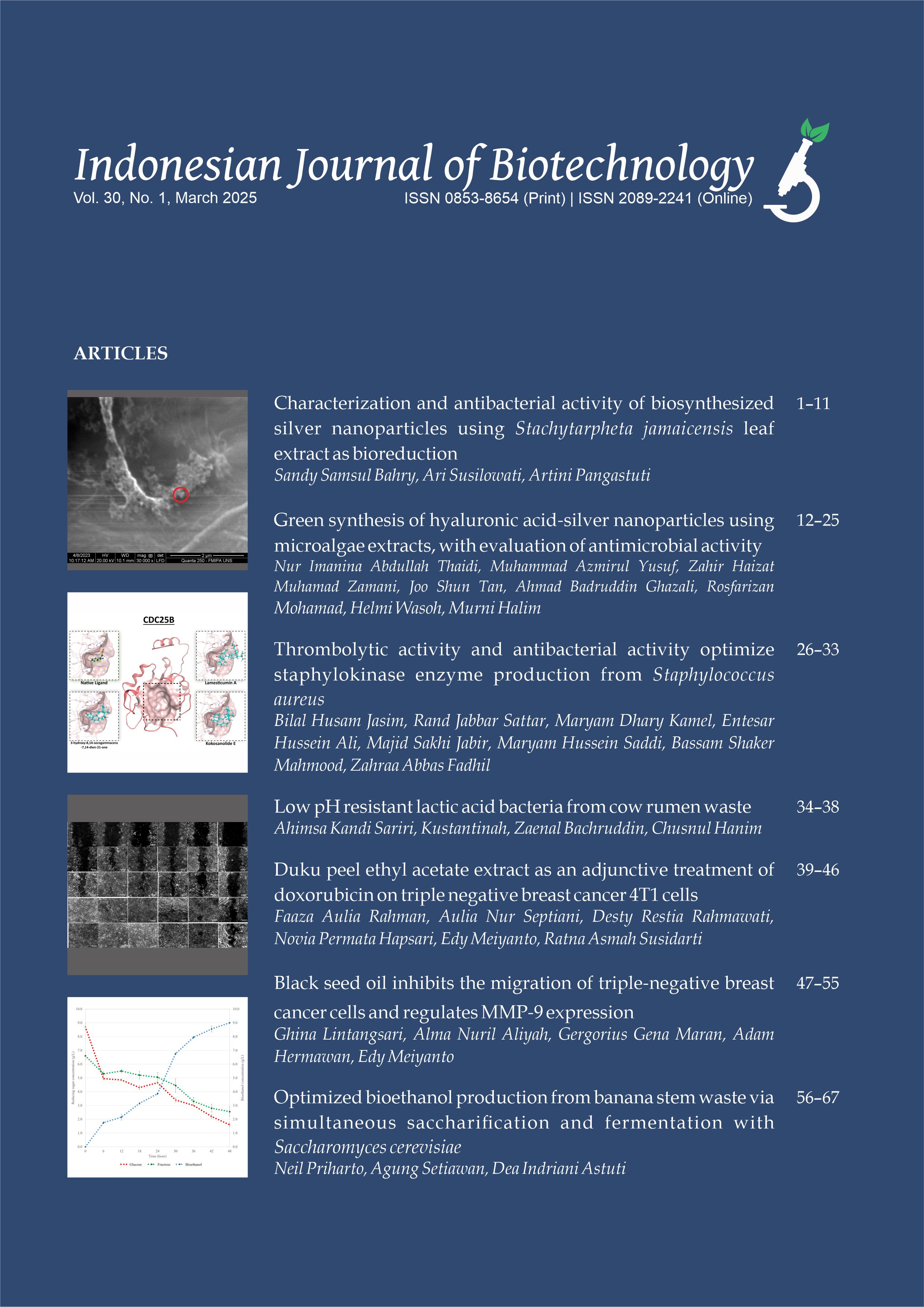The efficacy of a chicken antibody for the development of immunoassay‐based rapid detection in sugarcane mosaic virus disease
Nurmalasari Darsono(1*), Widhi Dyah Sawitri(2), Retnosari Apriasti(3), Agus Heri Setyo Wahyudi(4), Putri Andreyna Saragi(5), Victorin Mega Putri(6), Sugiharto Sugiharto(7), Win Darmanto(8)
(1) Biology Department, Faculty of Science and Technology, Airlangga University, Jalan Mulyorejo, Surabaya 60115, Indonesia; Research Center for Genetic Engineering, National Research and Innovation Agency, BJ Habibie Building, Jalan MH Thamrin 8, Jakarta Pusat 10340, Indonesia
(2) Agronomy Department, Faculty of Agriculture, Universitas Gadjah Mada, Jalan Flora, Bulaksumur, Yogyakarta 55281, Indonesia
(3) Center for Development of Advanced Science and Technology (CDAST), University of Jember, Jalan Kalimantan 37, Jember 68121, Indonesia
(4) Biotechnology Laboratory, PT Perkebunan Nusantara XI, Jl. Merak 1, Surabaya 60175, Indonesia
(5) Institute of Science Technology and Health, Jl. Kemuning 57A, Jombang 61413, Indonesia
(6) Institute of Science Technology and Health, Jl. Kemuning 57A, Jombang 61413, Indonesia
(7) Biology Department, Faculty of Science and Technology, Airlangga University, Jalan Mulyorejo, Surabaya 60115, Indonesia; Institute of Science Technology and Health, Jl. Kemuning 57A, Jombang 61413, Indonesia
(8) Biology Department, Faculty of Science and Technology, Airlangga University, Jalan Mulyorejo, Surabaya 60115, Indonesia; Institute of Science Technology and Health, Jl. Kemuning 57A, Jombang 61413, Indonesia
(*) Corresponding Author
Abstract
Sugarcane Mosaic Virus (SCMV) infection is one of the most serious problems that can result in severe yield loss of sugarcane. Since the symptoms of SCMV infection are similar to other biotic and abiotic stress symptoms, the development of a rapid diagnostic with high precision is required. The use of laboratory animals such as rabbits is required for antibody production in immunoassay‐based detection. However, due to its many advantages, specific chicken egg yolk immunoglobulin (IgY) has received considerable attention as an alternative antibody production in immunodiagnostics for infectious diseases. In this study, IgY antibody against SCMV recombinant coat protein (CP) was successfully obtained from chicken blood serum and tested to compare its efficacy against antibody from rabbit (IgG) using immunocapture reverse transcription‐polymerase chain reaction (IC‐RT‐PCR). The result showed that IgY and IgG could detect 0.1 g SCMV infected leaves using 1000‐times‐diluted antibodies. The IgY antibody was also confirmed to be reproducible and potentially applicable in plant disease diagnostics using an antibody‐based detection.
Keywords
Full Text:
PDFReferences
Addy HS, Nurmalasari, Wahyudi AHS, Sholeh A, Anugrah C, Iriyanto FES, Darmanto W, Sugiharto B. 2017. Detection and response of sugarcane against the infection of Sugarcane mosaic virus (SCMV) in Indonesia. Agronomy. 7(3):50. doi:10.3390/agronomy7030050.
Amro WA, AlQaisi W, AlRazem F. 2018. Production and purification of IgY antibodies from chicken egg yolk. J. Genet. Eng. Biotechnol. 16(1):99–103. doi:10.1016/j.jgeb.2017.10.003.
Apriasti R, Widyaningrum S, Hidayati WN, Sawitri WD, Darsono N, Hase T, Sugiharto B. 2018. Full sequence of the coat protein gene is required for the induction of pathogenderived resistance against sugarcane mosaic virus in transgenic sugarcane. Mol. Biol. Rep. 45(6):2749–2758. doi:10.1007/s1103301843261.
Astuti NT, Darsono N, Widyaningrum S, Sawitri WD, Wahyuningsih SPA, Darmanto W. 2019. Expression and purification of recombinant coat protein of sugarcane mosaic virus from Indonesian isolate as an antigen for antibody production. Indones. J. Biotechnol. 24(1):57–64. doi:10.22146/ijbiotech.45551.
Cerovska N, Moravec T, Plchova H, Hoffmeisterova H, Dedic P. 2012. Production of Polyclonal Antibodies to the Recombinant Potato virus M (PVM) Nonstructural Triple Gene Block Protein 1 and Coat Protein. J. Phytopathol. 160(5):251–254. doi:10.1111/j.1439 0434.2012.01886.x.
Darsono N, Azizah NN, Putranty KM, Astuti NT, Addy HS, Darmanto W, Sugiharto B. 2018. Production of a polyclonal antibody against the recombinant coat protein of the sugarcane mosaic virus and its application in the immunodiagnostic of sugarcane. Agronomy. 8(6):93. doi:10.3390/agronomy8060093.
Hamdayanty H, Hidayat SH, Damayanti TA. 2016. Expression of Recombinant Sugarcane Streak Mosaic Virus Coat Protein Gene in Escherichia coli. HAYATI J. Biosci. 23(3):111–116. doi:10.1016/j.hjb.2016.11.001.
Hardjo PH. 2014. Overekspresi gen SoSUT1 untuk meningkatkan translokasi sukrosa pada tanaman tebu [SoSUT1 gene overexpression to improve sucrose translocation on Sugarcane (Saccharum spp. hybrids) plant]. Doctoral dissertation, Faculty of Science and Technology Airlangga University, Surabaya.
Júnior l, Pacheco J, Santos D, Sousa I, Ian M, Alves E, Alves L, Rosado I. 2018. Gallus gallus domesticus: immune system and its potential for generationof immunobiologics. Cienc. Rural 48(08):1–8. doi:10.1590/01038478cr20180250.
Khanal V, Ali A. 2021. High mutation frequency and significant population differentiation in papaya ringspot virusw isolates. Pathogens 10(10):1278. doi:10.3390/pathogens10101278.
Koohapitagtam M, Nualsri C. 2013. Production of polyclonal antibodies specific to the recombinant coat protein of Blackeye cowpea mosaic virus and its use in disease detection. Kasetsart J. Nat. Sci. 47(4):603– 613.
Koolivand D, Bashir NS, Behjatnia SA, Joozani RJ. 2016. Production of polyclonal antibody against Grapevine fanleaf virus movement protein expressed in Escherichia coli. Plant Pathol. J. 32(5):452–459. doi:10.5423/PPJ.OA.01.2016.0031.
Li X, Wang L, Zhen Y, li S, Xu Y. 2015. Chicken egg yolk antibodies (IgY) as nonantibiotic production enhancers for use in swine production: A review. J. Anim. Sci. Biotechnol. 6(1):40. doi:10.1186/s40104 01500388.
Lima J, Nascimento A, Radaelli P, Purcifull D. 2012. Serology Applied to Plant Virology. Rijeka: InTechOpen. URL http://www.intechopen.com/books/ser ologicaldiagnosisofcertainhumananimalandp lantdiseases/serologyappliedtoplantvirology.
Mardanova ES, Ravin NV. 2021. Transient expression of recombinant proteins in plants using potato virus X based vectors. Methods Enzymol. 660:205–222. doi:10.1016/bs.mie.2021.05.013.
Narat M. 2003. Production of Antibodies in Chickens. Food Technol. Biotechnol. 41(3):259–267. URL ht tps://hrcak.srce.hr/file/175395.
Nemoto M, Yamanaka T, Bannai H, Tsujimura K, Ueno T, Mekata H, Yoshida A, Koyama A, Kokado H. 2018. Comparison of two agar gel immunodiffusion protocols for diagnosing equine infectious anemia. J. Vet. Med. Sci. 80(8):1245–1247. doi:10.1292/jvms.18 0103.
Omar AF, ElKewey SA, Sidaros SA, Shimaa AK. 2011. Egyptian isolates of Papaya ringspot virus form a molecularly distinct clade. J. Plant Pathol. 93(3):569– 576. URL http://www.jstor.org/stable/41999033.
Reddy CVS, Sreenivasulu P, Sekhar G. 2011. Duplex immunocapturing RTPCR for detection and discrimination of two distinct potyviruses naturally infecting sugarcane (Saccharum spp. hybrid). Indian J. Exp. Biol. 49(1):68–73.
Rubio L, Galipienso L, Ferriol I. 2020. Detection of Plant Viruses and Disease Management: Relevance of Genetic Diversity and Evolution. Front. Plant Sci. 11:1092. doi:10.3389/fpls.2020.01092.
Stills HF. 2012. Chapter 11 Polyclonal Antibody Production. New York: Academic Press. doi:10.1016/b978 0123809209.000110.
Viswanathan R, Ganesh Kumar V, Karuppaiah R, Scindiya M, Chinnaraja C. 2013. Development of DuplexImmunocapture (DuplexIC) RTPCR for the Detection of Sugarcane streak mosaic virus and Sugarcane mosaic virus in Sugarcane. Sugar Tech 15(4):399–405. doi:10.1007/s123550130216y.
Yoo HN, Jung YT. 2014. Expression of lily mottle virus coat protein and preparation of igy antibody against the recombinant coat protein. Korean J. Hortic. Sci. Technol. 32(4):544–554. doi:10.7235/hort.2014.13167.
Article Metrics
Refbacks
- There are currently no refbacks.
Copyright (c) 2023 The Author(s)

This work is licensed under a Creative Commons Attribution-ShareAlike 4.0 International License.









